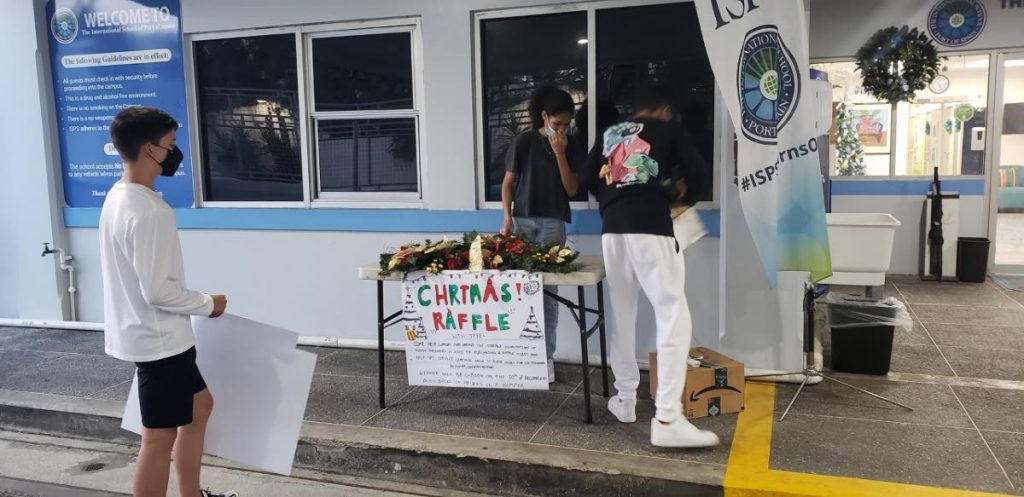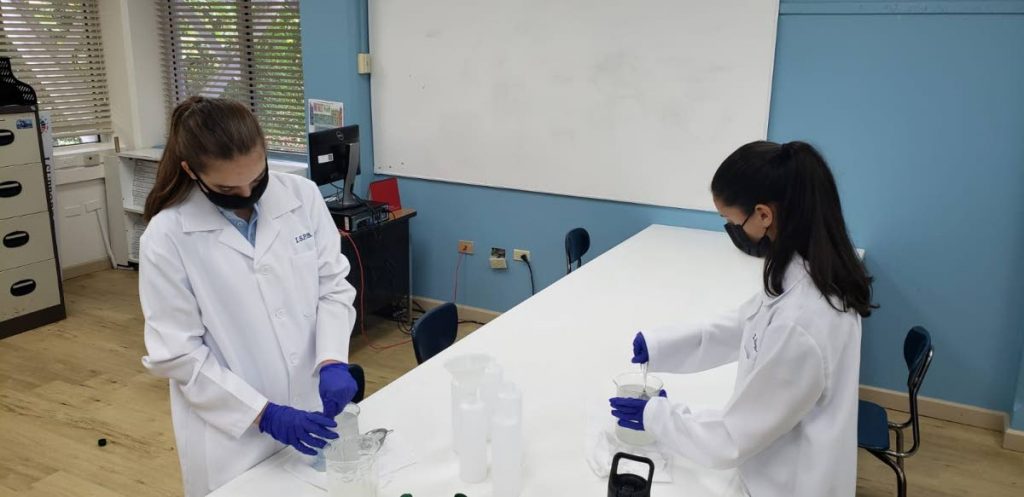International School students raise funds for needy in prison

Last December a small group of students gathered at the International School of Port of Spain (ISPS) to organise Christmas gifts they hoped would make an impact on fighting covid19. Some had a bake sale to raise funds to help the needy in prisons; others worked in a science lab to make hand sanitiser.
The last 14 months has been difficult for students isolated at home because of the pandemic, but these students forged unexpected connections through service learning or community service. Even during lockdown they found ways to contribute to society and learn more about themselves and this country. They say they learned more than they could have ever imagined.
“We wanted to know how we could make the most impact during these times,” said Jonathan Fernandes. “After talking to people, we decided we would produce care packages for inmates in our prisons.”
Kiki Liscott, the science teacher in charge of these students’ community service project, said she tried to steer the students away from a prison project.
“I thought it would be easier for them to work with the homeless, a women’s shelter or an orphanage, but 85 per cent of the students insisted on pursuing a prison project. They were determined to make this work,” she said. “They fought for their idea.”
“We did our research about covid19,” said Rohan Bhagwansingh, “and we were worried about where covid19 would spread the most. We thought that this could happen in a crowded place like our prisons.”
After contacting their retired librarian (me) and the Wishing for Wings Foundation, which does work in prisons, students had a Zoom meeting with Winfield Walker, assistant superintendent at the Port of Spain Prison, about prisons’ needs during the pandemic.
“In prisons, we operate in a closed society and because of security, no one gets a look at the work of an officer and the life of an inmate, so it was very telling to see these students choose prisons as a project,” said Walker. “They asked about prison officers’ work, prison conditions and fighting covid19 in prisons.
“Not many people are interested in people who are incarcerated and what a corrections officer does. They were concerned about the challenges we have as a confined community.”
One group of students decided on a clothes drive and fundraising activities to raise money for care packages that would include hand soap, toothbrushes and toothpaste. They asked for names of the most needy inmates so they could personalise the packages. Then they held a raffle.

A $20 ticket gave a chance to win chocolate and cookies. Students raised $1,055.
By May, they had raised a total of $2,680 through their raffle, donations and a bake sale with cookies and brownies – all organised virtually and hand-delivered when schools closed.
Covid19 thwarted some of their efforts. A school lockdown cancelled their doubles sale.
Now, the students wait for the country to open back up so they can make their care packages.
In the meantime, they think of all they have learned.
“Communication was a challenge. We were often working from home and had to communicate on the internet,” said Ella Brocklesby.
“The experience showed me people in prison may have done things in the past they can’t change, and they don’t have the rights or tools to get what normal people can get, and we could help them get a few items during this pandemic,” said Bhagwansingh. “I think about how they can’t see their families.”
Students created presentations to educate the rest of the school about the plight of inmates.
“It was important it wasn’t just about raising money. We wanted it to be a learning experience,” said Liscott. “Students gave up their free time on Saturdays. They put a lot of passion and energy into this project.”
Bhagwansingh said he was not one of the students initially in favour of a prison project. In the end, he said, “I learned how easy it is to end up in prison.”
“Service-learning has been an invaluable experience,” said Hadeed. “We learned about injustice in this country and how long people wait for their trials. Some of them can be innocent, and they wait for over ten years for a trial.”
While they wait to distribute their care packages, the students have educated others about prisons and the justice system in TT.
“We created PowerPoint presentations for classes in school, and we put posts on Instagram to create awareness on social media,” said Dylan De Verteuil.
Last year ISPS had decided to make service an integral part of the school curriculum in order to “build social and academic capacities,” said the school’s website.
The plan was that every class from PreK through secondary school would participate in some community service project for 90 minutes a week so students could benefit academically and socially through real-life experiences.
“Lockdowns made this impossible for many classes, but grades 10-12 pursued their projects,” said Maeve O’Donovan, the school’s vice-principal.
One group named themselves the Pandemic Difference Makers (PDM). Gabrielle MacKenzie said, “We strive to better our community.”
MacKenzie and other students led by Mario Davis, the Athletic Director and After School Activities Director at ISPS decided to learn to make hand sanitiser.
“We wanted to assist the less fortunate during these unfortunate circumstances,” said MacKenzie.
Again, students did their research and tracked down people who would assist them.
“We found an article that said Carib (brewery) was making hand sanitisers to be distributed to the public. We e-mailed them and received the supplies from them. We followed up with a scheduled demonstration of how to make the hand sanitiser from Abdon Ramdas, a Carib representative.”
The students turned their science lab into a hand-sanitiser factory, making ten cases of hand sanitiser. Each case holds 36 bottles containing 750 ml of hand sanitiser. Students gave cases to St Finbar’s Geriatric Centre, St Mary’s Children’s Home and Golden Grove Remand Prison.
“This experience taught us to be more empathetic and more aware of the rest of the world during these uncertain times,” said MacKenzie. “We feel proud that we were able to assist the less fortunate. We were blessed with the opportunity to obtain resources during the pandemic, and we came together to provide resources for others.”
“As the athletic/after school activities director, it was tough not being able to interact with the students through sports and physical activity,” said Davis. “This class helped me to remember one of the most valuable lessons we learn through sports: teamwork. They came together in the spirit of teamwork to help those in need during this pandemic. It brought a powerful message that we can all get through this together.”

In 2019, when the school decided to integrate service learning into the curriculum for all students from pre-K through Grade 12, teachers never dreamed the initiative would begin in the middle of a pandemic, but Helen Brocklesby, the director of ISPS, said, “Despite the global pandemic and having a virtual school, it felt vital to keep moving ahead with our strategic plans. The ISPS vision of inspiring thinkers and doers to create a better world has never seemed so relevant and so necessary.”
Brocklesby’s mission has been to create learning experiences beyond the classroom.
“A pillar of our approach for delivering our vision is entrepreneurial thinking, where we support students to identify challenges or gaps and then actively seek creative solutions to those problems. We want our students to be empowered and powerful as change-makers. As a school, we have to lead by example and model this ourselves.”
Looking back on the school’s service learning during the time of covid19, Brocklesby said, “While it wasn't easy, the leadership team worked to find a way to deliver what we had planned.”
In a challenging academic year unimaginable to all, these students turned learning into an unforgettable experience.

Comments
"International School students raise funds for needy in prison"